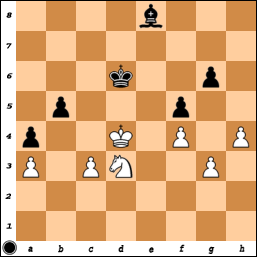CORRESPEONDENCE chess is thriving - indeed it is arguably going through a golden age.
Snail-mail and even email tournaments are old hat - today's events are server-based, which eliminates postage costs and arguments over how much time has elapsed.
People who do not play correspondence chess tend to believe it has been destroyed by analysis engines.
It is true engines are used in virtually all serious tournaments, especially those organised via the Fide-recognised International Correspondence Chess Federation.
But games are still being won and lost because an analysis engine by itself cannot stand up to an engine+player.
I recently completed six games on board 2 for Sussex Servers in division 2 of the 5th British Webserver Tournament, scoring +2=3-1 against a field averaging 2196 (my ICCF rating of 2260 put me exactly halfway in the seedings).
It is not often an over-the-board game is won in under 25 moves, and that happens even less frequently at correspondence, but happen it does:
Spanton (Sussex Servers - 2260) - Marc R Wakeham (Natcor A - 2130)
English Opening
1.c4 Nf6 2.Nc3
Over-the-board I have tended to prefer 2.g3, as recommended in various publications by GMs Andrew Soltis, Tony Kosten and Nigel Davies, but here I decided to play more directly - at least at first.
2..g6 3.g3 Bg7 4.Bg2 0-0 5.e4
More popular is 5.Nf3.
The text, heading for a Botvinnik set-up, is disliked by Kosten and Davies when Black is not committed to ...e5. But it has been played by Kasparov and Kramnik, and Soltis writes: "The Botvinnik tends to work best when Black has played (the) KN to f6, thereby cutting down control of White's d4 from the Black bishop at g7" (Winning With The English Opening, 3rd edition, 1997).
5...d6 6.Nge2 c5 7.0-0 Bd7
A rare continuation, but it is liked by Komodo9, and we soon transpose into regular lines.
8.d3 Nc6 9.h3
Preparing Be3, which in turn hopes to get in d4.
 |
| There are more than 700 games with this position in ChessBase's 2018 Mega database |
Black's next move is only third-most popular, but it was played by Larsen and Gligoric, and it results in White only scoring 47 percent in Mega18.
9...Ne8 10.Be3 Qc8!?
This may be a novelty. Most popular is 10...Nd4, stopping d4, after which the main line runs 11.Rb1 a5, when six different moves have been tried for White, none with conspicuous success.
11.Kh2 Nc7
It was still possible to block White in the centre with ...Nd4.
After the text, Komodo9 considers White more-or-less has to play 12.d4 to maintain equality, while Stockfish9 reckons 12.d4 gives White the upper hand!
12.d4 cxd4 13.Nxd4 Ne6 14.Nde2 Nc5
 |
| Komodo9 at first is happy with Black's position, but can you see a positional problem for Black? |
***
***
***
***
***
***
15.f4!?
The engines like the consolidating 15.b3. Indeed, Stockfish9 comes to calculate White's advantage after this as winning!
The text prepares to exploit the positional defect in Black's position - the way most of Black's pieces are bunched on the queenside.
15...Rb8
Ignoring White's demonstration, which admittedly does not look like it adds up to much at the moment.
16.Rb1 Na5?!
Going after the weak c pawn.
Komodo9 prefers 16...Na6, while Stockfish9 gives 16...f5, but both engines reckon White is more than half-a-pawn better.
17.Nd5
Stockfish9 narrowly prefers 17.b3, but it turns out the c pawn does not need defending.
But not 17.b4? Nxc4, when the e3 bishop is hanging.
17...Re8 18.Bd4 Bxd4 19.Nxd4
19.Qxd4 is also strong.
19...Nxc4
There seems to be nothing better than taking the pawn and hoping to weather the storm.
20.f5 Bc6
20...Kg7 can be met by, among other moves, 21.Nxe7, winning the exchange.
Maybe 20...Nb6 was best, but after 21.b4 Nxd5 (Komodo9's 21...Na6 hardly helps Black's kingside deficiencies, and anyway transposes) 22.exd5 Na6 23.Qd2, White has a roaring attack.
21.Qc1 Nb6
Or 21...Bxd5 22.exd5 Ne5 23.Qh6, and Black cannot get enough defenders across to the kingside.
22.Qh6 Bxd5 23.exd5 Rf8 24.b4 1-0
After 24...Ncd7 comes 25.Ne6! eg 25...fxe6 26.fxg6 hxg6 27.Qxg6+ Kh8 28.Be4 and mate follows.

















